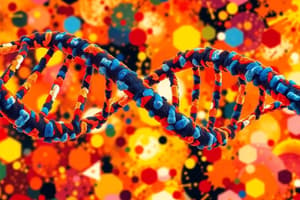Podcast
Questions and Answers
What is the role of Taq polymerase in the Polymerase Chain Reaction (PCR)?
What is the role of Taq polymerase in the Polymerase Chain Reaction (PCR)?
- To add complementary DNA nucleotides (correct)
- To attach primers to the DNA strands
- To cut the DNA into fragments
- To heat the DNA for separation
What are the three main steps of the Polymerase Chain Reaction process?
What are the three main steps of the Polymerase Chain Reaction process?
- Priming, Cutting, Amplifying
- Denaturation, Cutting, Priming
- Denaturation, Annealing, Extension (correct)
- Heating, Cooling, Sequencing
At what temperature does denaturation occur in the PCR process?
At what temperature does denaturation occur in the PCR process?
- 94-96 degrees Celsius (correct)
- 72 degrees Celsius
- 50-60 degrees Celsius
- 80-90 degrees Celsius
What is the purpose of using primers in PCR?
What is the purpose of using primers in PCR?
Why is Taq polymerase considered heat-resistant?
Why is Taq polymerase considered heat-resistant?
What is the significance of DNA sequencing in identifying hereditary diseases?
What is the significance of DNA sequencing in identifying hereditary diseases?
What occurs during the annealing phase of PCR?
What occurs during the annealing phase of PCR?
Which hereditary disease is mentioned as an application of PCR and DNA sequencing?
Which hereditary disease is mentioned as an application of PCR and DNA sequencing?
Which component of the sequencing reaction serves as an anchor for nucleotide addition?
Which component of the sequencing reaction serves as an anchor for nucleotide addition?
What is the role of dideoxynucleotide triphosphates (ddNTPs) in the DNA sequencing process?
What is the role of dideoxynucleotide triphosphates (ddNTPs) in the DNA sequencing process?
In the DNA sequencing procedure, how many different tubes are used to separate the ddNTPs?
In the DNA sequencing procedure, how many different tubes are used to separate the ddNTPs?
What technique is used to visualize the products of DNA sequencing after they have been formed?
What technique is used to visualize the products of DNA sequencing after they have been formed?
What type of nucleotide lacks an OH group, preventing the addition of further nucleotides to the DNA chain?
What type of nucleotide lacks an OH group, preventing the addition of further nucleotides to the DNA chain?
What component is tagged with a radioactive label for visualization during manual sequencing?
What component is tagged with a radioactive label for visualization during manual sequencing?
Which form of nucleotide corresponds to deoxy adenine triphosphate?
Which form of nucleotide corresponds to deoxy adenine triphosphate?
How does DNA polymerase contribute to the sequencing process?
How does DNA polymerase contribute to the sequencing process?
Study Notes
Evidence of Evolution through Biotechnology
- DNA helicase separates DNA strands for replication.
- PCR (Polymerase Chain Reaction) mimics natural DNA replication.
- Taq polymerase from Thermus Aquatics is heat-resistant, allowing for replication at high temperatures.
Polymerase Chain Reaction (PCR) Steps
- Denaturation (94-96°C): DNA strands are separated by heating.
- Annealing (55-65°C): Temperature is lowered, and primers attach to each DNA strand.
- Extension/Elongation (72°C): Taq polymerase adds complementary nucleotides, extending the DNA strand from the primer.
Key Components in DNA Replication
- A primer's role is crucial as it serves as a starting point for nucleotide addition.
- Amplification of genes enables quick sequencing and mutation detection, aiding hereditary disease diagnosis, e.g., Sickle-Cell Anemia.
DNA Sequencing
- DNA sequencing determines the precise order of nucleotides using Fredrick Sanger’s method.
- Key reaction components include:
- Template Strand: Single-stranded DNA to sequence.
- Primer: Anchor for nucleotide addition.
- Deoxynucleotide Triphosphates (dNTPs): Four nucleotides (A, T, G, C) that extend the primer.
- Dideoxynucleotide Triphosphates (ddNTPs): Stop nucleotide extension due to lack of OH group.
Master Mix Components for Sequencing
- Template Strand, Primer, dNTPs, DNA polymerase, ddNTPs are mixed together.
- The reaction is divided into four tubes corresponding to different ddNTPs.
Gel Electrophoresis and Manual Sequencing
- Each tube will terminate sequences at a specific nucleotide (A, T, G, C) depending on the ddNTP used.
- Gel electrophoresis separates the DNA fragments.
- Primers are tagged with a radioactive label, allowing visualization on X-ray film as dark bands.
- Results are interpreted by researchers to read the DNA sequence.
Studying That Suits You
Use AI to generate personalized quizzes and flashcards to suit your learning preferences.
Description
This quiz explores the role of biotechnology in understanding evolution, particularly through DNA replication mechanisms. It covers key concepts such as the function of DNA helicase, Taq polymerase in PCR, and the natural processes that these techniques mimic.



